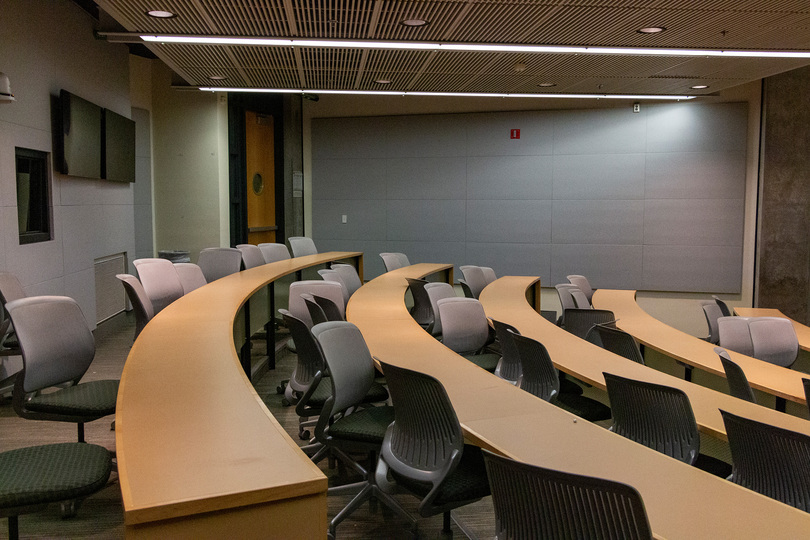Opinion: Recording policies don’t properly fix concerns, hurt learning

Our columnist argues SU’s new classroom recording policy is a step backward and discourages methods that may ease semester burnout. SU should enable students to learn in ways that support their success and wellbeing, not reduce them. Francis Tang | Daily Orange File Photo
Get the latest Syracuse news delivered right to your inbox.
Subscribe to our newsletter here.
On Aug. 7, Syracuse University updated its classroom recording policy, just a week before the start of the fall semester.
This policy unnecessarily prohibits students from recording in a classroom setting without explicit approval from the instructor of the class. It also requires instructors to inform students of any intention to record their lectures on the first day of class.
“This policy seeks to strike a balance … by maintaining the benefits available to instructors and students through the strategic use of classroom recordings while aligning with many of our peer institutions who have adopted policies to prohibit or limit the recording of class sessions to protect the privacy of instructors and students,” according to its website.
SU’s peer institutions, including Northeastern University, Columbia University and Cornell University, have put similar recording policies into place over recent years, trying to ensure students feel safe in their classrooms to share diverse ideas.
Instead of turning away students from recording lectures for themselves, institutions should encourage them to take whatever steps they need to elevate their education.Will Chadwick, Columnist
“Our strong commitment to students’ academic success includes the assurance that classrooms are spaces where instructors and students confidently engage in the free exchange of ideas about a diverse array of topics, including controversial issues that are marked by strongly held differences of opinion,” SU said in its rationale defending the policy changes.
Albeit thoughtful, the revised policy overestimates how much recording deters professors and students from speaking their mind.
Last semester, I took a geography class. It turned out to be the most informative and engaging class I’ve taken at SU. What made these lectures great was the diversity of topics presented along with the open-mindness of the professor and students.
Another great thing about the class was that all the lectures were recorded. If I was unable to attend or wished to revisit a particular lecture, all I had to do was go online. Despite this indefinite accessibility, not once did it seem like the lectures being recorded deterred a student, or my professor, from speaking their mind and doing so productively.
The revised policy discourages the use of helpful technologies in classrooms. With college students facing burnout at alarming rates, the university needs to allow students to use their technologies in ways that benefit them.
The policy doesn’t outright ban students from recording, but it requires students to receive explicit permission from their instructor. This extra step is an obstacle.
The policy will also prove ineffective, as it’s difficult to enforce. If a student doesn’t receive permission from an instructor and decides to record regardless, it’s unlikely a professor will notice the student recording and call them out.
Professors now reserve the right to tell students they aren’t allowed to record. This will be harmful for students who previously relied on recorded lectures to stay caught up in class.
The one way students can get around this is by receiving accommodations from the Center for Disability Resources. The issue with this is that the CDR only recognizes disabilities that align with those in the Americans with Disability Act. This prevents students who just have a hard time keeping up in class from getting an exemption.
Universities need to reconsider narrowing recording policies. Instead of turning away students from recording lectures for themselves, institutions should encourage them to take whatever steps they need to elevate their education. Lecture recordings are a tool to aid in learning – one I’ve seen and used firsthand.
There are parts of the policy that deserve credit, though, such as SU’s concern for recordings being posted online. The policy prohibits students from publishing class recordings online or sharing with friends to cheat.
We shouldn’t be able to publish, that’s fair. But not every student has malicious intent. Some are recording for their own personal use, and shouldn’t be limited to the professor’s approval.
Rather than limiting rights to record, SU should revamp the policy to focus on action that will be taken if an individual uses a recording for anything but their own academic gain.
Will Chadwick is a sophomore magazine, news and digital journalism major. His column appears weekly. He can be reached at wchadwic@syr.edu.





